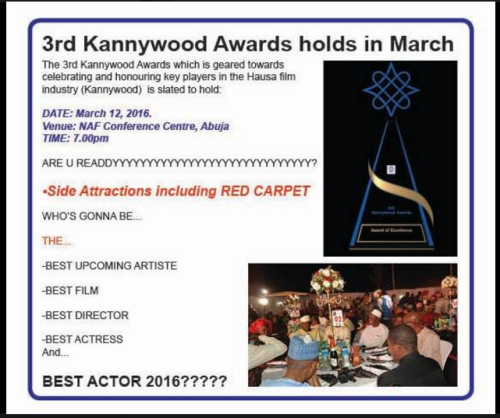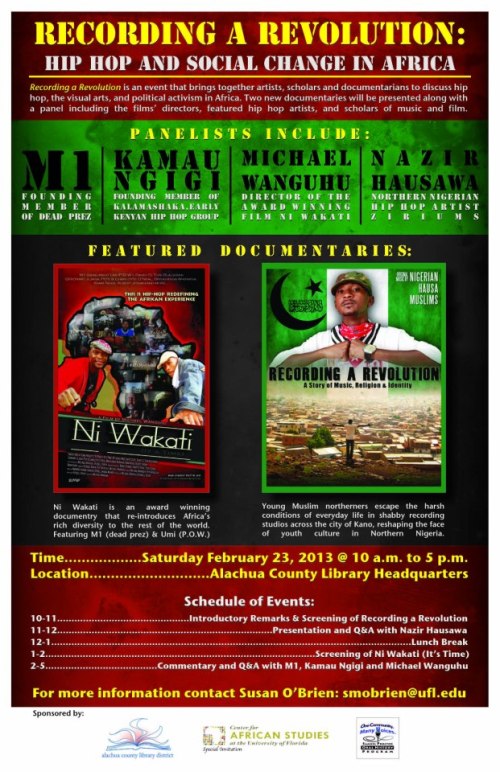SUBMIT ENTRIES FOR THE 4TH EKO INTERNATIONAL FILM FESTIVAL, NOVEMBER 18-23, 2013, LAGOS, NIGERIA.
SUBMISSION DEADLINES
Standard Deadline: September 30, 2013.
Late Deadline: October 15, 2013.
Call For Entry Form
THE MAIN SECTIONS
Feature Film
Short Film
Fiction
Comedy
Drama
Horror
Documentaries
Student Film
1 minute short films.
ELIGIBILITY
Films must fit into one of the nine categories:Feature,Short, Fiction, comedy, documentaries, drama, Horror, Student Film 1 minute.
All music and other copyrighted materials used in the films must be original or filmmakers must have obtained permission in writing from the owner, such permissions to be submitted with the film.
All films must be submitted in English or subtitled in English.
GENERAL RULES:
Films must be submitted on DVD NTSC or PAL (please test before sending) and be available for screening on 35mm composite condition, Beta SP or Digi-Beta Video (NTSC only for festival screening).
Films must be available for screening during the Eko International Film Festival.
Narrative and Documentary films with U.S. distribution (obtained prior to being selected for EKOIFF screening) or films produced, financed or initiated by a major film studio or television network are ineligible for competition, but may be considered for special screening. Selection for screening will be determined no later than one month prior to the festival. Films that have screened at major cinemas and on cable network or distributed to theaters prior to the festival dates are also ineligible for competition.
Films that have played in Nigeria in a theatrical setting to a public audience are not eligible to be screened at the EKOIFF 2013.
Additional Narrative Feature Film Entry Requirements:
Feature-length Films must be 60 minutes or longer (recommended length 90 minutes).
Open to anyone (and all nationalities) who wishes to enter.
Additional Narrative Short Film Entry Requirements:
Films must be short narratives of 40 minutes or less (recommended length 10 minutes).
Open to anyone who wishes to enter.
Additional Narrative Student Short Film Entry Requirements:
Films must be short narratives of 40 minutes or less (recommended length 10 minutes).
Open only to students (must include proof of enrollment from accredited university or college).
One Minute Short Film Entry Requirements:
Entries must be short films of 1 minute (recommended length).
Award will be given to the best 1 minute film.
Open to any form of animation.
Open to anyone who wishes to enter.
Additional Documentary Feature Films Requirements
Films must be Documentaries, 40 minutes or longer
Open to anyone who wishes to enter.
Additional Documentary Short Film Requirements
Films must be Short Documentaries, 40 minutes or less
Open to anyone who wishes to enter.
SUBMISSION IS FREE
Please Note: Eko International Film Festival does not collect entry fees.
In a similar respect the EKOIFF does not solicit films to be in competition.
Only films submitted will be considered for competition.
Returns and Acknowledgments:
VHS tapes, DVDs, and press materials will not be returned under any circumstances. They will be destroyed after the final screenings at the film festival.
Include a self-addressed, stamped postcard for each submission if you wish acknowledgment of the receipt of your entry.
Safety and piracy issue
The festival is concerned that filmmakers’ rights should be protected against piracy. EKOIFF is establishing procedures that will guarantee these are up to profession’s best practice. These are inspired by the anti piracy actions taken in the USA and worldwide.
FILM COMPETITION AWARDS:
Eko International Film Festival welcomes partners and sponsors for the following prizes.
Nollywood Divas Awards
Jury Awards:
Narrative Films Awards
Documentary Films Awards
Short Film Awards
Eko International Film Festival Film Submission Agreement Form
Submissions from July 1- October 15, 2013
I, (first name:)…………………………………………………..
(last name:)…………………………………………………………..
Act as right owner hereafter described as “The filmmaker” own right for the following film (film name)…………………………..
The filmmaker grants permission to Eko International Film Festival (EKOIFF) and Supple Communications Limited to use clips of your film for promotional use.
The filmmaker grants the non-exclusive right for EKOIFF and Supple Communications Limited to screen, exhibit and distribute your film in its entirety for any promotion or project under the festival or foundation’s name for up to one year after the 2012 festival. EKOIFF and Supple Communications Limited may also actively pursue other distribution opportunities for your film.
The filmmaker grants EKOIFF and Supple Communications Limited and other third parties at their discretion the right to film, videotape and/or photograph your appearance or voice for any and all marketing and promotional activities for the festival.
Your submission of an entry into the Eko International Film Festival constitutes an agreement between you and EKOIFF and Supple Communications Limited, and that by submitting your film for consideration, you agree to all of these rules, terms and agreements.
Date../../2013
Name: ………………………………
Signature: …………………………
Send with your DVD to
Hope Obioma Opara
The President
Eko International Film Festival
Supple Co mm unications Limited
1, Bajulaiye Road,
Morocco Bus Stop
Shomolu, Lagos,
Nigeria.
Email: submissions@ekoiff.org
PS: ONLY SPONSORED PRIZES WILL BE AWARDED.





